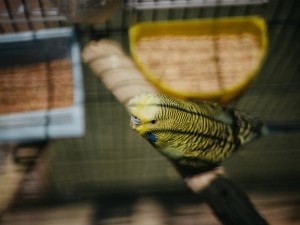
Parakeets can live quite long and healthy lives, that is, if they can maintain good health and don’t become injured.
Unfortunately, a variety of things can cause your bird to become sick and parakeet illnesses can cause a variety of symptoms to show up.
You may be inclined to think that a parakeet sitting at the bottom of the cage fluffed up is sick, this article looks into it
Parakeet at bottom of cage fluffed up:
A parakeet that fluffs its feathers up either does this because it is cold or because it is ill, and if it sits at the bottom of its cage in addition to having fluffed-up feathers then the bird is most certainly ill.
Sitting at the bottom of the cage may mean that the bird is so ill that it doesn’t have the strength to fly up to perch higher up in the cage
Another sign that sick parakeets will usually display is being quieter than usual.
Other birds in the flock can tell when a bird is sick. The other flock members may kill a sick bird if they think that the sick bird can infect and kill them.
So, a bird that is sick will try to avoid drawing attention to itself, it will be quiet and will be sick in silence to keep other birds from noticing it and trying to kill it.
Other signs that you may see in sick birds include labored breathing, tail bobbing, excessive sleeping, weakness, weight loss, lethargy, fast breathing, a runny nose, diarrhea, and general signs of distress.
What to do:
If your bird is suffering from an illness then taking the bird to the vet is the recommended treatment option.
Animals, these birds included, will try their best to avoid showing signs of being in pain.
In the wild, predators would be attracted to and would target animals who looked as though they were sick or in pain.
Because of this, parakeets will avoid showing signs of being sick or being in pain until they physically can’t hide the signs of being sick or in pain.
The bird’s sickness is likely quite serious at this stage so taking the bird to the vet as soon as you can after seeing signs of illness is a must.
There are precautions that need to be taken when taking your bird to the vet.
You would need to keep the bird in a small box or a pet carrier and cover the box to keep your bird from seeing outside, this will keep it from becoming anxious on the way to the vet.
Also, drive calmly on your way to the vet, driving erratically will only make the bird anxious.
If you can’t immediately get the bird to the vet then you would need to isolate the bird away from the other birds to keep it from getting attacked and you’d need to give the isolated bird its own food and water.
Doing this will keep the other birds from becoming infected with the sickness if it is contagious.
If you enjoyed this article then you may also be interested in other bird related articles. Here are some articles that you may be interested in: Letting An Untamed Bird Out Of The Cage, How To Stop Cage Aggression In Birds, Budgie Flying Around Cage At Night, Budgie Bullying Other Budgie

